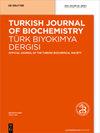幽门螺杆菌根除是否影响感染患者的体成分、饮食摄入、血清瘦素和胃饥饿素水平?
IF 0.7
4区 生物学
Q4 BIOCHEMISTRY & MOLECULAR BIOLOGY
Turkish Journal of Biochemistry-turk Biyokimya Dergisi
Pub Date : 2014-01-01
DOI:10.5505/TJB.2014.71463
引用次数: 0
摘要
目的:考虑到肥胖与多种疾病之间的关系,并考虑到幽门螺旋杆菌感染对瘦素和饥饿素水平的影响,我们决定确定根除幽门螺旋杆菌对感染患者体成分、饮食摄入、瘦素和饥饿素水平的影响。方法:本研究纳入100例患者。内镜检查后,通过快速脲酶试验和组织病理学评估确定活动性幽门螺杆菌感染。3个月时尿素呼气试验证实根除。根除前后分别采用Seca量表、麦尔tron Bioscan 916和24小时召回食物问卷对患者的体重、体成分和膳食摄入量进行评估。采用酶联免疫吸附法(ELISA)检测血清瘦素和胃饥饿素。结果:根除后患者的平均体重、脂肪质量和体细胞质量均有所增加,但只有体重的变化有统计学意义(P=0.01)。研究结束时,平均游离脂肪质量和游离脂肪质量百分比显著降低(P<0.05)。根除对饮食摄入、血清瘦素和胃饥饿素水平无显著影响。结论:根据我们的研究结果,根除幽门螺旋杆菌导致患者体重和脂肪量的增加具有统计学意义,而治疗后饮食摄入量、血清瘦素和胃饥饿素水平没有变化。似乎根除幽门螺杆菌后胃食管反流病的发生率增加可能是由于这些患者体重增加所致。因此,饮食咨询可以帮助幽门螺杆菌感染的患者预防根除后体重增加。本文章由计算机程序翻译,如有差异,请以英文原文为准。
Does Helicobacter pylori eradication effect body composition, dietary intake, serum leptin and ghrelin levels of infected patients?
Objective: Take in to account the relationship between obesity and many diseases and con- tradictory published results considering the effects of H. pylori infection on leptin and ghre- lin levels, we decided to determine the effect of H. pylori eradication on body composition, dietary intake, leptin and ghrelin levels of infected patients. Methods: This study included 100 patients. After endoscopy, active infection with H. pylori was determined by rapid urease test and histopathology evaluation. Eradication was con- firmed by the urea breath test at 3 months. The body weight, body composition and dietary intake of patients were assessed by Seca scale, Maltron Bioscan 916 and 24-hour recall food questionnaire respectively before and after eradication. Serum leptin and ghrelin were deter- mined by enzyme linked immunosorbent assay (ELISA) kits. Results: The mean body weight, fat mass and body cell mass of patients increased after eradication but only the changes of body weight was statistically significant (P=0.01). The mean free fat mass and percentage of free fat mass decreased significantly at the end of study (P<0.05). Eradication has no significant effect on dietary intake, serum leptin and ghrelin levels. Conclusion: According to our findings, eradication of H. pylori lead to a statistically signifi- cant increase of body weight and fat mass in patients while dietary intake, serum leptin and ghrelin levels of subjects did not change after treatment. It seems that enhanced incidence of gastro-esophageal reflux disease after H. pylori eradication may be due to increased body weight of these patients. Therefore dietary consulting can be helpful in H. pylori infected patients for preventing of weight gain after eradication.
求助全文
通过发布文献求助,成功后即可免费获取论文全文。
去求助
来源期刊
CiteScore
1.20
自引率
0.00%
发文量
0
审稿时长
6-12 weeks
期刊介绍:
Turkish Journal of Biochemistry (TJB), official journal of Turkish Biochemical Society, is issued electronically every 2 months. The main aim of the journal is to support the research and publishing culture by ensuring that every published manuscript has an added value and thus providing international acceptance of the “readability” of the manuscripts published in the journal.

 求助内容:
求助内容: 应助结果提醒方式:
应助结果提醒方式:


